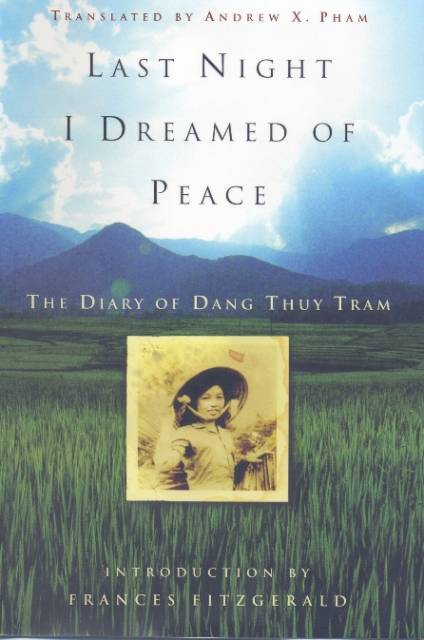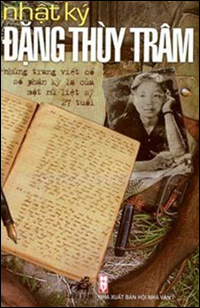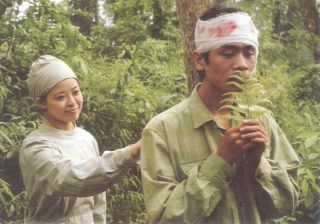|

VOICE OF A VICTIM
In the morning of June 22, 1970, an American patrol spotted four Vietnamese moving down a jungle trail in Quang Ngai province. They opened fire and killed two of them on the spot – a North Vietnamese soldier and a young woman.
When they searched her body, they found no weapons, but medicine, bandages, a small radio and a diary. The war had come to an end for 27 year old Dang Thuy Tram* – but without the peace that she yearned for after two years as a combat doctor and surgeon in the South.
(*Dang Thuy Tram is known by her middle name, because her younger sister also bears the name Tram).
An American soldier took the diary. It returned to Vietnam decades later, in 2005, when an American photographer handed over a copy of the diary to her family in Hanoi. Thuy's diary has now been published in Vietnam and overseas, attracting thousands of readers.
“Last Night I Dreamed of Peace” has become an important testimony to the immense suffering, which decades of war brought on the Vietnamese.

Thuy's diary is a bestseller in Vietnam
Thuy's diary was saved by coincidence. The US soldier Fred Whitehurst was about to follow the standing instructions of burning all documents with no intelligence value, when his interpreter said to him: "Please do not burn this book, it has fire in it already." The interpreter had spent the previous night reading the diary, and it had made a strong emotional impact on him to be confronted with a real human being in stead of the usual Southern propaganda pictures of the ruthless enemy from the North. 30 years later the diary resurfaced in Texas.

Minh Huong plays Dang Thuy Tram in "Don't burn", a magnificient movie about the diary.
In 2009 Thuy's diary was turned into the heartbreaking, but beautiful movie Dong Dot (Don't burn) by director Dang Nhat Minh. Minh's father had been Thuy's teacher, before she was sent to the front, and therefore Thuy's family agreed to cooperate with him on the movie about her diaries. The film deserves world wide attention for its simple, yet compelling account of the last week's of Thuy's life, before she was shot dead, followed by the story of how the diary was returned to Thuy's family in Ha Noi many years later.
Thuy’s diary tells, how thousands of common Vietnamese found their ways to cope with their personal lives in the struggle for their country. Her account holds no orchestrated propaganda - Thuy's words are much more powerful than that. Her daily entries radiate immense sadness, frustration and anger in the endless and often vain attempts to save lives in the primitive jungle clinics of the war torn province.
Quang Ngai was one of the most fiercely contested provinces in the South, and as the war escalated Thuy and her guerilla patients were constantly chased by bombs and bullits. Her clinics were destroyed and rebuilt numerous times during her two years at the Southern front.
Here is what Thuy wrote on 29 June 1969, a year before her death:
“This morning they bring me a wounded fighter. A phosphorous bomb has burned his entire body. An hour after being hit he is still burning, smoke rising from his body. This is Khanh, a 20 year old man…
I stand frozen before this heart breaking tableau.
His mother weeps. Her trembling hands touch her son’s body. Pieces of his skin fall off, curled up like crumbling sheets of rice cracker. His younger and older sisters are attending him, their eyes full of tears. A girl sits by his side her gentle eyes are glassy with worry. Clumps of hair wet with sweat cling to her cheeks, reddened by exhaustion and sorrow. Tu is Khanh’s lover.
The pain is imprinted on the innocent forehead of that beautiful girl. Looking at her, I want to write a poem about the crimes of war, the crimes that have strangled to death millions of pure and bright loves, strangled to death the happiness of millions of people, but I cannot write it. My pen cannot describe all.”
“Last night I dreamed of peace” also reveals Thuy’s unhappiness, because the war had eroded her relationship with “M”, the man she promised herself to back in Ha Noi. He was fighting somewhere else on the Southern front. She writes about how miserable she often feels, having left Hanoi and her family behind - and how she bonds emotionally with fellow medics and patients to find just a little love in a world of terror and pain.
And she lets out her frustration that some party cadres talk behind her back, questioning the sincerity of this ‘bourgeois girl’ from Hanoi, who shows her feelings openly. Her answer is quiet contempt for a commissar, who did not have the courage to stay too close to the clinic and the wounded soldiers for fear of enemy attacks.
In proving him wrong, Thuy paid with her life. In writing it all down she offered us a chance to learn from the ordeal of millions of Vietnamese people. Quang Ngai was also the province where the infamous My Lai Massacre took place in March 1968 along with a number of other killings carried out by the notorious Tiger Force, a US Elite Unit. The atrocities were covered up by Pentagon officials, including later Defense Secretary Donald Rumsfeld,who put a stop to an internal army investigation.
However, the well documented killings were exposed three decades later in a Pulitzer Prize winning series of articles in the Toledo Blade, a local newspaper in Ohio. The Tiger Force conducted extensive search and destroy operations in the area, where Thuy and many others were killed. Like Thuy's diary, the evidence came to light by co-incidence.
When the Pentagon decided to drop the investigation, a frustrated internal army inspector, who had been in charge of the investigation, illegally copied the documents, including sworn testimonies, and hid them in his basement. After his death in 2003, a relative found the documents and handed them over to the local newspaper in Toledo.
Dang Thuy Tram: Last night I dreamed of peace. Harmony books (New York, 2007)
Dung Dot - Starring Minh Huong as Dang Thuy Tram, Director Dang Nhat Minh (2009)
Michael Sallah and Mitch Weiss: Tiger Force. Time Warner Books (New York, 2006)
Click here to return to the main page
|